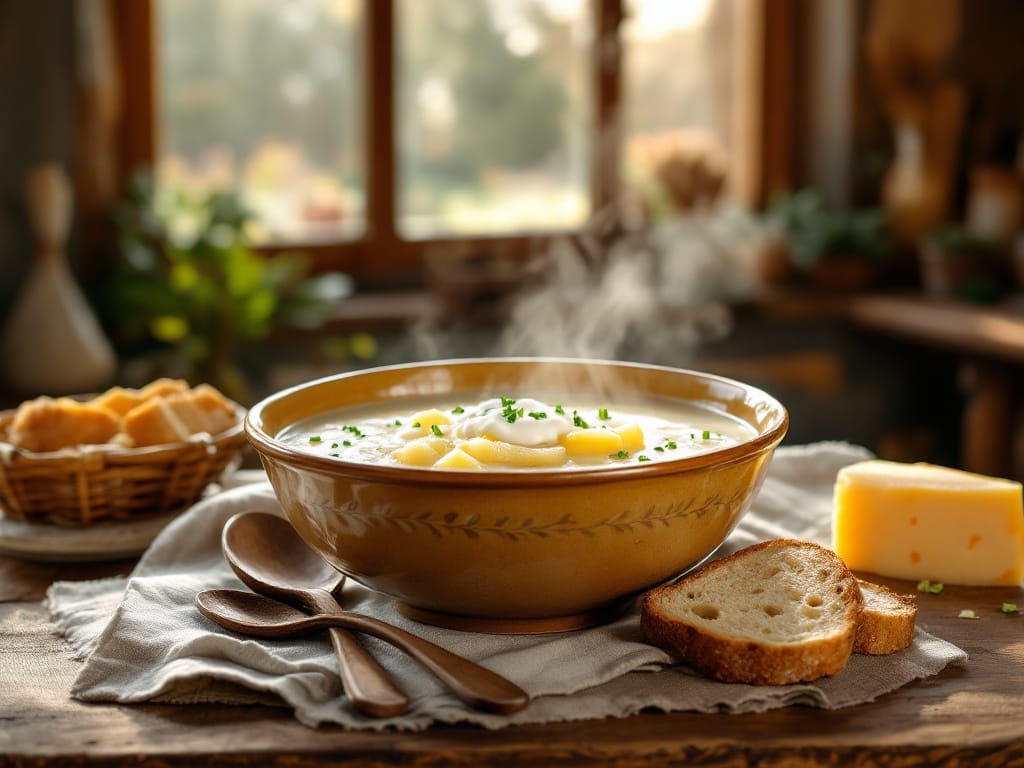Potato soup is a comforting and hearty dish perfect for chilly days. However, when you make a big batch, you might wonder: Can you freeze potato soup? Freezing can be a great way to save leftovers, but it comes with some challenges. This guide will walk you through the best methods to freeze potato soup without losing its creamy texture.
Can You Freeze Potato Soup?
Yes, you can freeze potato soup! Freezing this dish is an excellent way to extend its shelf life and enjoy it later. However, there are important considerations. Starchy potatoes and dairy in the soup can undergo texture changes during freezing, leading to a grainy or separated consistency when reheated.
To learn more about the process for potato soup, visit How to Make Potato Soup Easy?.
Why Freezing Potato Soup Can Be Tricky
Freezing potato soup isn’t as straightforward as freezing other soups. Here are the main challenges you might face:
- Texture changes in potatoes: When frozen, the starch in potatoes can break down, resulting in a grainy or mushy texture. This can be unappealing when reheating the soup.
- Dairy separation: Cream or milk can separate during freezing and thawing, leaving the soup less creamy and visually unappealing.
- Flavor alterations: Freezing may slightly alter the flavor profile, especially if the soup contains dairy or delicate herbs.
For freezer-friendly options, explore slow cooker potato soup recipes that are specifically designed to withstand freezing. These variations often eliminate ingredients prone to freezing issues and ensure a satisfying reheated result.

Tips for Freezing Potato Soup Without Compromising Quality
Follow these expert tips to ensure your potato soup stays delicious after freezing:
- Cool the soup completely: Let the soup cool to room temperature before freezing to prevent condensation and the formation of ice crystals that can affect texture.
- Avoid adding dairy before freezing: Skip cream, milk, or cheese during the initial preparation. Add these ingredients after reheating to maintain the soup’s creamy consistency.
- Portion the soup: Use airtight containers or freezer-safe bags to divide the soup into single-serving portions. Be sure to remove excess air to prevent freezer burn.
- Blend the soup: Pureed or blended soups freeze better than chunky ones because they reduce the risk of texture changes in the potatoes.
- Label and date: Clearly label the soup with the freezing date to keep track of storage time and ensure it’s consumed within its optimal period, typically within three months.
By following these steps, you can enjoy flavorful, creamy potato soup even after freezing!
Reheating Frozen Potato Soup
Proper reheating ensures your soup regains its original creamy texture. Follow these steps for the best results:
- Thaw in the refrigerator: Allow the soup to thaw overnight in the fridge. Gradual thawing helps prevent sudden texture changes and maintains the soup’s quality.
- Reheat gently: Use a stovetop on low heat, stirring constantly to prevent curdling. Avoid high heat, as it can cause the dairy to separate.
- Adjust consistency: If the soup seems thick, add a splash of milk or broth while reheating. This restores creaminess and helps balance the texture.
For more ideas on Potato Soup , explore ou Loaded Baked Potato Soup.
Variations of Potato Soup and Their Freezing Potential

Not all potato soups freeze equally. Here’s how different variations perform when frozen:
- Dairy-free potato soups: These are the most freezer-friendly. Replace cream with alternatives like coconut milk, almond milk, or cashew cream to avoid curdling or separation issues.
- Chunky vs. blended soups: Blended soups freeze better because they eliminate the problem of potatoes breaking down. Smooth textures remain consistent after thawing, while chunky soups may have mushy potatoes.
- Vegan potato soups: Soups with plant-based thickeners, such as blended cashews or nutritional yeast, are less likely to experience texture changes, making them ideal for freezing.
By selecting or modifying recipes to align with these variations, you can enjoy freezer-friendly potato soup with minimal effort!
FAQs About Freezing Potato Soup
Here are answers to common questions about freezing potato soup:
- Can you freeze potato soup with cream?
It’s best to add cream after reheating to avoid curdling or separation during the freezing and thawing process. - What happens if you freeze potato soup with potatoes?
The potatoes can become grainy or mushy due to the breakdown of starch during freezing. - How long can potato soup be stored in the freezer?
Properly stored, potato soup lasts up to 3 months in the freezer. Ensure airtight packaging to maintain quality. - How do you prevent texture changes in frozen potato soup?
Blending the soup and avoiding dairy before freezing helps maintain a smoother texture. - Can I freeze store-bought potato soup?
Yes, but the same rules apply: avoid freezing soups with cream already added for the best results.
By following these tips, you can confidently store and enjoy potato soup without worrying about texture or flavor issues!

Conclusion
Freezing potato soup is absolutely possible with the right techniques. By following these tips, you can preserve the creamy texture and rich flavor of your soup for months. Remember to:
- Skip the dairy before freezing.
- Use proper storage containers to prevent freezer burn.
- Reheat the soup gently to restore its original texture.
Whether you’re preparing meals in advance or saving leftovers, freezing potato soup is a convenient way to make your life both easier and tastier! Try these methods, and enjoy a comforting bowl of soup whenever you need it.









